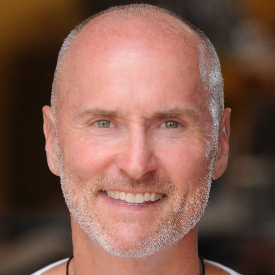Chip Conley is a New York Times bestselling author, speaker, and the founder of one of America’s first boutique hotel companies. He was the previous Head of Global Hospitality and Strategy for AirBNB and CEO of the Modern Elder Academy. He received his BA and MBA from Stanford University, and holds an Honorary Doctorate in Psychology from Saybrook Graduate School & Research Center, where he is the school’s 2012 Scholar-Practitioner in residence.
Below, Chip shares five key insights from his new book, Learning to Love Midlife: 12 Reasons Why Life Gets Better with Age. Listen to the audio version—read by Chip himself—in the Next Big Idea App.

1. I’m relieved my body no longer defines me.
Our obsession with getting older is so focused on the physical, on how it looks, that we don’t prepare for what it feels like to experience midlife. Aging is a privilege, a gift of time. Yet so many of us focus our middle-age conversations on what we have lost: we share “organ recitals” of what body parts no longer work as they used to. Unlike a tree whose age is defined by its internal rings, we age in public, cursed or blessed with our external wrinkles. How we feel about our longevity is on display, not only in our attempts at concealment but in how we embrace or resist our additional years. For me, I felt comfortable in my own skin just as it started to sag.
What a relief it is to no longer be defined by my brawn or beauty. As we age, we realize that this rental vehicle we were issued at birth will have its inevitable dings and chipped paint, but what really matters as our body depreciates isn’t what it looks like on the outside but how it feels on the inside. Yes, we need to maintain this vehicle, but it becomes less about short-term vanity and more about long-term maintenance. And that gives us so much more time to invest in the other important playing fields beyond the physical: the emotional, the relational, the mental, the vocational, and the spiritual.
2. I invest in my social wellness.
It’s revealing that the word “illness” starts with an “i,” while “wellness” starts with “we.” What if we look at our wellness as a shared responsibility, striving for social, not just personal, wellness? In midlife, we’ve often starved ourselves of friendships because we’ve been so busy with the spinning plates of being in the “sandwich generation” with a proliferation of professional and personal obligations. Social science research is conclusive that the most common variable for those living happy, healthy lives into their eighties and beyond is how invested they were in social relations in midlife.
“The shorter life we have ahead of us, the more we prioritize our relationships in the moment.”
Friends aren’t a “nice-to-have.” They’re a “need-to-have.” Our friends, family, and community are our “emotional insurance.” The shorter life we have ahead of us, the more we prioritize our relationships in the moment. This is part of the reason that the U-curve of Happiness research shows that life begins at 50 as we get happier with each decade after bottoming out in our late 40s. As the Velveteen Rabbit suggests, “Generally, by the time you are Real, most of your hair has been loved off.” One of my saving graces of midlife is just how authentic my relationships have become. I no longer show off to others. I show up for others.
3. I’m marveling at my wisdom.
Knowledge is in my iPhone. Wisdom is in my gut (and, of course, my gut is getting bigger). Our painful life lessons are the raw material for our future wisdom. By midlife, we’re experts in the school of life and are “first-class noticers” of our patterns. We’re also more adept at moving from the left to the right brain such that we can be logical and lyrical in the same sentence. This crystallized intelligence, popularized in Arthur Brooks’ book From Strength to Strength, is valuable because, in a world in which we’re awash in knowledge, we’re desperately in need of the distilled value of wisdom.
Wisdom is a social good. It’s meant to be shared as a wise person makes everyone around them better. My experience, at 52, as the “modern elder,” twice the age of my Airbnb colleagues, gave me a sense that I still had relevance, especially as a “motivational listener.” Knowledge speaks, and wisdom listens. It also gave me a taste of what Erik Erikson called “generativity,” the desire to positively impact younger people in ways that will survive me.
4. I’m starting to experience time affluence.
Midlife is when we outgrow our pursuit of happiness and start our practice of joy. If we joyously step off the treadmill and ruthlessly edit our lives, we create the space to become a beginner again. Curiosity and an openness to new experiences are two variables correlated with happiness later in life, so why not create the spaciousness to experience a second adulthood? Midlife offers the opportunity to move from human doing to human being.
“In midlife, we should always be a beginner at something.”
Our experience of time changes as we age. After all, a year represents 10 percent of a 10-year-old’s life but just 2 percent of a 50-year-old’s life. Researchers explain that we gauge time by memorable events. The more such events, the slower time seems to pass, but because we often have fewer new things to remember as we age, life seems to accelerate. I learned how to surf and speak Spanish at 57 because I asked myself the following questions, “What do I know or have I done now that I wish I’d learned or did ten years ago? More importantly, 10 years from now, what will I regret if I don’t learn it or do it now?” In midlife, we should always be a beginner at something. Experiencing new “firsts” in our lives stretches time.
5. I feel as if I’m growing whole.
We’re growing old, but we’re also growing whole. In the first half of our lives, our “selves” are compartmentalized: the person we are at work is often different from the person we are with our spouse and kids. By midlife, we start to re-member ourselves so that we feel integrated, not scattered. You start to feel a quiet comfort in yourself and in your connection with something bigger than you. As Modern Elder Academy faculty member Richard Rohr suggests, “We live wholeness when we ‘re-member’ our story and, through it, experience a deeper sense of being part of a greater whole.” In our wholeness, we find a holiness, a stirring inside that draws us to meaning and spirit.
One of the beauties of creating the world’s first midlife wisdom school, MEA, is witnessing people in their 40s, 50s, and 60s becoming whole in the presence of others becoming whole as well. Maybe the midlife “crisis” language should be replaced with a “chrysalis,” such that midlife is a time when we transform from a caterpillar into a butterfly. You may think you’re shattered in midlife, but this is just because life is offering you (with the help of your family and friends) the opportunity to feel the sense of accomplishment to put yourself back together again, piece by piece. Rest assured, you’re not the only one doing this.
To listen to the audio version read by author Chip Conley, download the Next Big Idea App today:






























